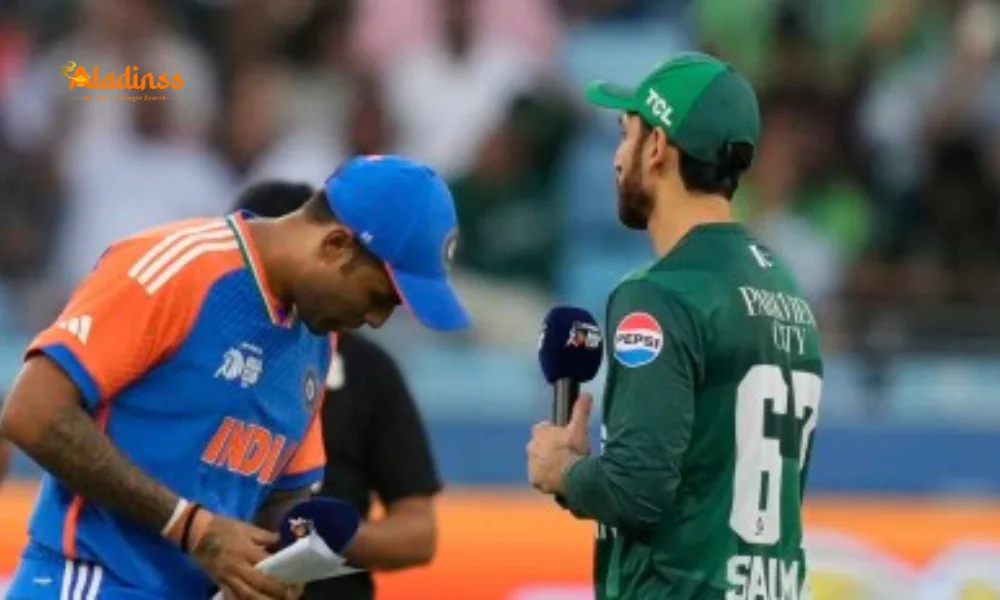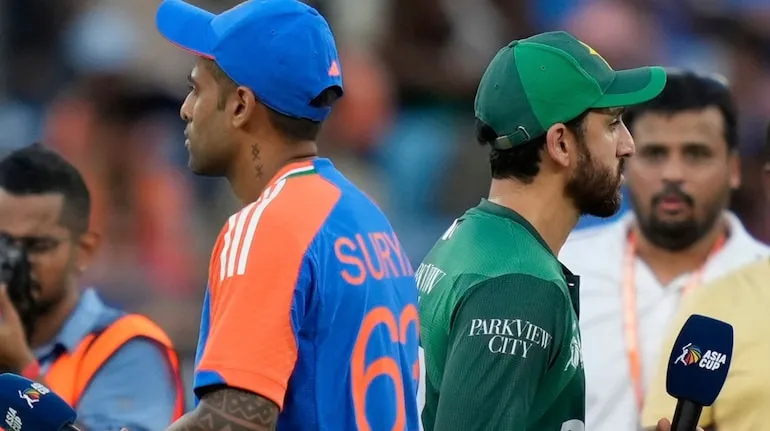Asia Cup Super 4: Suryakumar Yadav Avoids Handshake with Pakistan Captain Again

Asia Cup Super 4: Suryakumar Yadav Avoids Handshake with Pakistan Captain Again
In a moment that has sparked widespread discussion among cricket fans, Indian captain Suryakumar Yadav once again avoided shaking hands with Pakistan captain Salman Agha during the toss of the Asia Cup Super 4 match. This latest development in the high-stakes India-Pakistan rivalry has drawn sharp reactions, blending sportsmanship with geopolitical undertones. As the Super 4 stage unfolds in the United Arab Emirates, this incident highlights the intense emotions surrounding the fixture, captivating audiences worldwide.
The Toss Incident: What Transpired
The Asia Cup 2025 Super 4 round kicked off with Bangladesh's thrilling four-wicket victory over Sri Lanka in the opening match, setting an electrifying tone for the tournament. Today, the spotlight shifted to the second fixture between India and Pakistan, a clash that always promises edge-of-the-seat action. Suryakumar Yadav, leading from the front, won the toss and elected to bowl first, a tactical choice aimed at leveraging the dew factor later in the evening.
Traditionally, the post-toss ritual includes captains exchanging handshakes and pleasantries, followed by brief interviews with commentators. However, in a repeat of recent controversies, Yadav opted out of the customary handshake with Salman Agha. The moment, captured on live broadcast, showed Yadav proceeding directly to the commentary area, leaving Agha to stand momentarily before following suit. This subtle yet significant gesture immediately ignited social media, with fans dissecting its implications.

Echoes of the League Stage Controversy
This is not the first time such an incident has occurred during the Asia Cup. In the league round, Indian players had similarly avoided post-match handshakes with their Pakistani counterparts, creating a stir that transcended the boundaries of the cricket field. The gesture was interpreted by many as a show of solidarity, particularly in light of the recent Baghlam terror attack that claimed innocent lives and left Indian families in mourning.
Suryakumar Yadav addressed the earlier episode candidly, stating that the decision stemmed from a desire to honor the affected families. His words resonated deeply with supporters, framing the action as a poignant statement rather than mere snub. In the charged atmosphere of Indo-Pak cricket, where matches often carry the weight of national pride, such moments amplify the narrative, turning a simple game into a symbol of broader sentiments.
The Broader Context of Indo-Pak Cricket Rivalry
The India-Pakistan rivalry is one of the most storied in international sports, with each encounter drawing billions of viewers and evoking unparalleled passion. Hosted in the neutral venue of the UAE, the Asia Cup provides a platform for these teams to showcase their prowess without the distractions of home crowds. Yet, off-field gestures like the handshake avoidance add layers of complexity, reflecting the intertwined history of the two nations.
Historically, cricket has served as both a bridge and a battleground for India and Pakistan. From the inaugural Test in 1952 to modern T20 spectacles, moments of sportsmanship have often been overshadowed by political tensions. The Baghlam incident, a tragic reminder of ongoing security challenges, has undoubtedly influenced the current mood, making Yadav's actions a focal point for national discourse.
Fan Reactions and Social Media Buzz
Social media platforms exploded with reactions following the toss. Hashtags like #SuryakumarSnub and #IndVsPakHandshake trended globally, with Indian fans lauding Yadav's stance as a mark of resilience and patriotism. Pakistani supporters, on the other hand, viewed it as unsportsmanlike, calling for greater emphasis on the game's spirit. Commentators and former players weighed in, with some praising the captain's authenticity and others urging unity through cricket.
This divide mirrors the broader fanbase dynamics, where emotions run high and every action is magnified. The incident has also sparked debates on the role of athletes in geopolitics, questioning whether sports figures should navigate such sensitive terrains or focus solely on the pitch.
Suryakumar Yadav's Leadership Style
Since taking over as captain, Suryakumar Yadav has emerged as a dynamic leader, known for his innovative batting and calm demeanor under pressure. His decision to bowl first today underscores his tactical acumen, adapting to the Dubai conditions where dew can play a pivotal role in the second innings. Yet, this off-field gesture reveals a more personal side, one that prioritizes empathy and national solidarity over protocol.
Yadav's comments on the league stage incident highlighted his sensitivity to current events, stating that while respect for opponents remains paramount, certain moments demand a stronger statement. This approach has endeared him to many, positioning him as a captain who leads not just with strategy but with conviction. As the match progresses, all eyes will be on how this plays out on the field, where cricket's true magic unfolds.
Salman Agha's Response
Pakistan captain Salman Agha, a seasoned all-rounder, handled the moment with characteristic grace, focusing his post-toss interview on team preparations rather than the snub. Agha's leadership has been instrumental in Pakistan's resurgence, blending aggressive batting with shrewd bowling changes. His composure in the face of awkwardness exemplifies the professionalism expected at this level, potentially diffusing some of the tension.
In the commentary box, Agha discussed batting strategies, emphasizing the need to post a competitive total on a pitch offering variable bounce. His measured words contrasted with the brewing storm online, reminding viewers that the game's outcome would ultimately speak louder than any gesture.
The Stakes in Super 4: Path to the Final
With the league stage wrapped up, the Super 4 format intensifies the competition, featuring India, Pakistan, Bangladesh, and Sri Lanka in a round-robin battle for final spots. Today's match is crucial, as a win for either side would solidify their semifinal aspirations. Bangladesh's upset over Sri Lanka yesterday has shaken up the standings, making every point precious.
India, riding high on recent form, enters as favorites, with Yadav's squad boasting a balanced mix of explosive batsmen and crafty bowlers. Pakistan, never to be underestimated, relies on their unpredictable flair to turn games on their head. The handshake episode, while controversial, may fuel the fire, ensuring an all-out effort from both camps.
Tournament Implications
A victory here could propel India towards an unbeaten run, while Pakistan would need it to regain momentum after a mixed league campaign. The Super 4's structure, with cross-group matchups, adds unpredictability, keeping fans glued to the action. Beyond the result, this fixture often sets the tone for bilateral series and global tournaments, amplifying its significance.
As the innings unfold, the focus will inevitably return to cricket, but the toss incident lingers as a subplot. It underscores how deeply intertwined the sport is with cultural narratives, where a simple handshake—or its absence—can dominate headlines.
Sportsmanship in Modern Cricket
Cricket's ethos emphasizes fair play and mutual respect, yet real-world events often test these ideals. The ICC has long promoted unity through the gentleman's game, but instances like this reveal the human element at play. Yadav's choice echoes past controversies, such as player black armbands or silent protests, where athletes use their platform for advocacy.
Experts argue that while gestures matter, they should not overshadow the competition. In the Asia Cup's neutral setting, the emphasis remains on skill and strategy, with both teams fielding their best XIs. As Yadav prepares to lead his bowlers, the incident serves as a reminder of the multifaceted role captains play in representing their nations.
The global audience, tuning in from across the subcontinent and diaspora, awaits not just the scorecard but the stories that emerge. This Super 4 clash, laced with drama off the field, promises to be a defining moment in the 2025 edition.
Looking Beyond the Handshake
Despite the buzz, the heart of the day lies in the cricket itself. With Yadav opting to bowl, Pakistan's openers face a stern test from India's pace battery under the Dubai sun. The match's outcome could reshape the Super 4 landscape, influencing net run rates and head-to-head records.
Fans, divided yet united by their love for the game, will dissect every boundary and wicket. The handshake avoidance, while noteworthy, pales against the thrill of potential six-hitting sprees or bowling masterclasses. As the tournament progresses, such episodes add flavor, but it's the play on the field that endures in memory.
In the end, cricket's appeal lies in its ability to transcend, offering moments of joy amid complexities. Today's encounter, fraught with history and emotion, reaffirms why Indo-Pak matches remain the pinnacle of limited-overs excitement.
Comment / Reply From
No comments yet. Be the first to comment!








